News
PESA does not sell or take commission from any of the events listed on this website.

Symposium: The Changing Landscape of Education and ITE in Aotearoa
When: Friday 30 August, 9.30am–3.30pm
Where: Community Engagement Hub Rehua 108, Ilam Campus
Contact:
Co-hosted by Philosophy of Education Society of Australasia (PESA) and Te Kaupeka Ako Faculty of Education, this symposium brings together teachers, principals, academics and educators to draw on educational philosophy and theory to address topics of interest for practitioners in schools and centres.
Sessions:
The Changing Landscape of Education and ITE
Joce Nuttall, UC
Ethics and Decision Making in Education
Daniella Forster, Newcastle, AU
Culturally Responsive Practice
Jen Smith, Kay-Lee Jones, UC
Doing the Right Work the Right Way – Implications for Leadership Practice in Education
Panel discussion
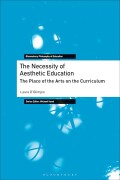 | Laura D’Olimpio, The Necessity of Aesthetic Education: the place of the arts on the curriculum, (Bloomsbury) 2024The Necessity of Aesthetic Education is a manifesto. That which is experienced through engagement with art, through the many various and diverse art forms and media, is uniquely and essentially valuable to the lives of human beings. In order to fully appreciate and gain the most out of the arts, which offer a variety of aesthetic experience, there are concepts, skills and techniques integral to such understanding. In this book, Laura D'Olimpio argues that aesthetic education ought to be a compulsory part of education for all school-aged students, from pre-primary to high school, on the basis of its distinctive value. Such an argument is timely, given the so-called crisis in the arts and humanities, with declining student numbers in subjects that do not have a direct vocational correlative, and increased focus on science, engineering, technology and mathematics (STEM) subjects. As funding cuts increasingly slash the support for the arts, there is a need to argue for why the arts and arts education is valuable, for their own sake, as well as for the positive contributions they can and do make to society. Through critical engagement with a range of thinkers including Maxine Greene, John Dewey and Elliot Eisner, D'Olimpio offers a unique and important contribution to aesthetic education, and to research within philosophy of education. https://www.bloomsbury.com/uk/necessity-of-aesthetic-education-9781350120907/ |

EPAT Special Issue: Naturalness and Artificiality in Education: Lessons From Fictional Texts
When: 10 July 2024
https://think.taylorandfrancis.com/special_issues/naturalness-artificiality-education/
Contact: Gideon Dishon
The special issue will thus contribute to the vivid discussion of AI and, more broadly to efforts on thinking how education should respond to ongoing global crises, focusing on changes in long-standing educational tensions and contradictions considering the emergence of new information technologies. Even more importantly, such discussions are intended to develop EPAT’s ongoing aim of thinking against the grain, examining how AI could make education more humane. To examine artificiality in education, papers will analyze such texts with both literary and traditional philosophical tools. This special issue welcomes texts that can address, but are not limited to, the following topics:
- Fictional representations of artificial intelligence (broadly construed), and their implications for thinking about education
- Literary or cinematic depictions of educational settings that include artificial students, teachers or learning
- The relationship between the natural or human and the artificial in educational practices
- The promises and dangers of artificiality as overcoming human vulnerability
- The possibility of artificial human attributes beyond intelligence (empathy, moral character, etc.)
- Analyses of narratological structures underlying engagement with artificiality in education
- Educational futures made possible by artificial intelligence, and their interplay with dominant and alternative modes of current thinking
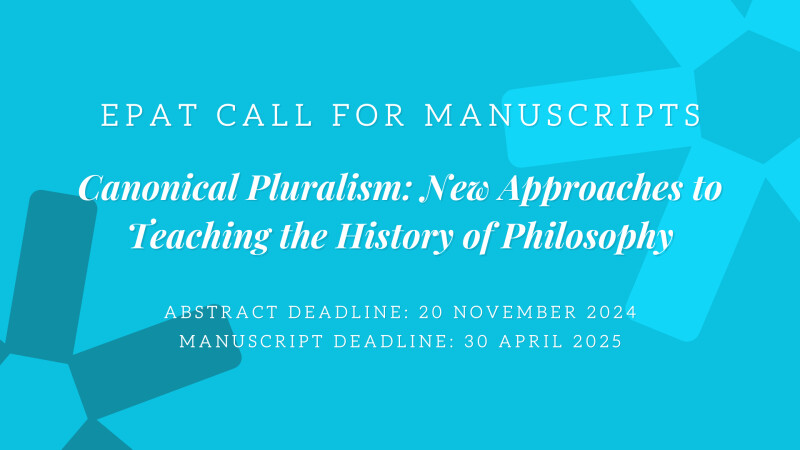
EPAT Special Issue on Canonical Pluralism: New Approaches to Teaching the History of Philosophy
When: 20 November 2024
https://think.taylorandfrancis.com/special_issues/canonical-pluralism/
In contrast to academic philosophy, teaching philosophy consists largely of reading philosophers from the past. This approach presupposes selecting works and authors that culminate in a ‘canon’: a set of works or authors from a specific period deemed outstanding by individuals at a later period. The formation of a canon is inherently subject to tension: While the criteria for canonical relevance reflect the outcome of a collective deliberation process, guided by philosophical experts and educators, these criteria are prone to perpetuating the social biases of a dominant tradition, social group, or class. This tension is particularly pertinent in the educational context. On one hand, philosophy educators face the task of conveying thought traditions that preserve an intellectual history. On the other hand, educators ought to minimize the risk of adopting methods that perpetuate problematic social biases. To balance these aims, this special issue explores pluralistic approaches to canonical relevance. Canonical pluralism, as we understand it, suggests that in order to minimize social biases, philosophy education requires pluralistic standards of ‘relevance,’ reflected and integrated into the content of canons and teaching methods. We invite submission for this special issue aimed at its three objectives: 1. to scrutinize the hermeneutical methods that acknowledge social biases in canonical authors and to question how these approaches alter our view of the conceptualization of canonical relevance; 2. to reflect on the philosophical presuppositions that underlie interdisciplinary and inclusive approaches to the history of philosophy to redefine what is considered canonically relevant; and 3. to explore the insights gained from decolonial perspectives that perceive the canon as an ongoing negotiation process.

PESA Pub Band Seeking Members!
When: ASAP
Contact:
The PESA Pub band needs you (to Shake Your Dewey)!
Keen to be a member of the world famous PESA Pub band?
Keen to play a selection of conference theme adjacent pub band numbers at a PESA Pub event in Christchurch, 2024?
Then get in touch with the PESA Pub manager Andrew (
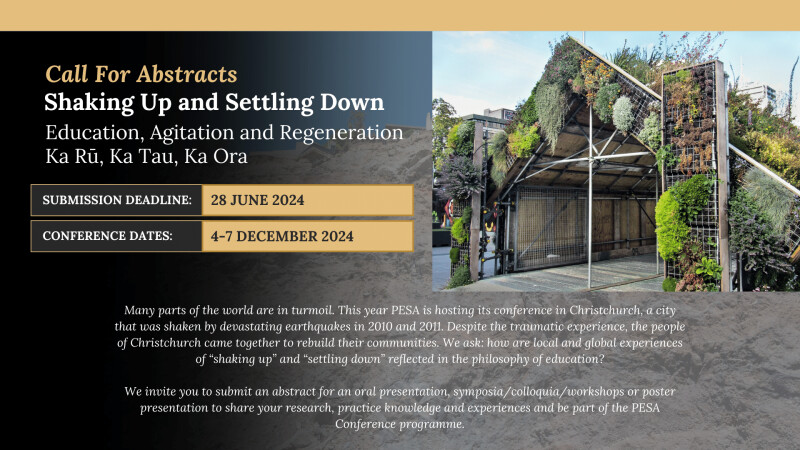
PESA Conference 2024 Call for Abstracts
When: 28 June 2024
https://www.pesaconference.org/call-for-abstracts-1
Contact:
We invite you to submit an abstract for an oral presentation, symposia/colloquia/workshops or poster presentation to share your research, practice knowledge and experiences and be part of the PESA programme.
We welcome abstracts which deliver on our Conference theme:
Shaking Up and Settling Down
Education, Agitation and Regeneration
Ka Rū, Ka Tau, Ka Ora
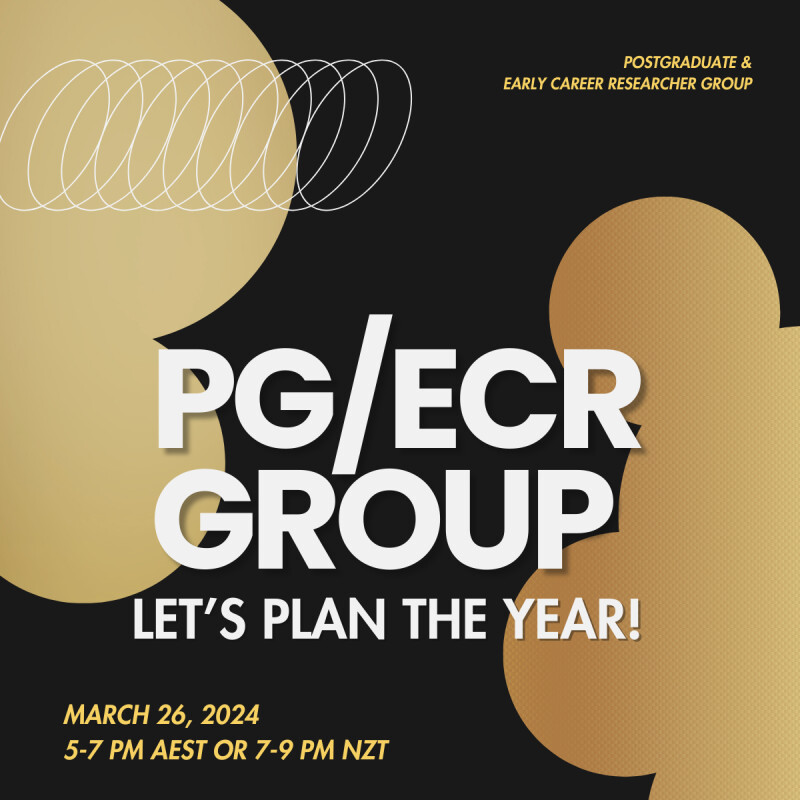
PG/ECR Group Meeting
When: March 26 @ 5-7pm AEST or 7-9pm NZT
Where: Zoom
Contact:
PESA has a special focus on supporting post-graduate students and early career researchers engaging with philosophy of education. The PG/ECR group welcomes members to participate in activities as decided by the members of the group, including philosophical discussions, reading groups, writing and editorial activities.
Our first meeting will be on Tuesday 26 March (5-7pm AEST or 7-9pm NZT) and will include an overview of the activities coming up for the year and opportunities to begin developing networks for potential collaborations.
All postgraduate and ECR members are welcome to join the group. For further inquiries, including how to join the group or participate in any of these activities, please contact the PESA Executive PG/ECR Representative, Dr. Sarah Gurr (University of Newcastle),
CALL FOR PAPERS | South Korea as Method: Korean Education as Postcolonial/Post-Oriental Discourse
https://think.taylorandfrancis.com/special_issues/korean-education-postcolonial-discourse/
Submit a Manuscript to the Journal
Educational Philosophy and Theory
For a Special Issue on
South Korea as Method: Korean Education as Postcolonial/Post-Oriental Discourse
Abstract deadline
15 April 2024
Manuscript deadline
01 November 2024
Special Issue Editors
- Young Chun Kim, Chinju National University of Education, South Korea
This email address is being protected from spambots. You need JavaScript enabled to view it. - Jung-Hoon Jung, Pusan National University, South Korea
This email address is being protected from spambots. You need JavaScript enabled to view it.
This special issue aims to explore the development of postcolonial/post-oriental educational theories and practices using South Korean cases.
This special issue welcomes articles on the following topics:
- South Korea as Colonized Ruins: History, Development, and Criticism of Educational Discourse (1945–2020).
- Qualitative Research as Postcolonial Praxis: South Korean Achievements, Examples, and Contributions in Educational Studies.
- South Korean Students’ Learning Culture as Post-Western Discourse on Academic Success.
- Beyond Finnish Lessons: The Culture of Korean Schooling and Teacher Practices.
- Beyond/Against the West: Deconstructive Approaches for Post-Oriental Educational Studies.
For more information about this special issue and for submission instructions, see:

Thinking From Everywhen: Philosophy, Indigenous Knowledge & Perspectives
When: 13-14th February 2024
Where: School of Philosophy, RSSS Building ANU
This workshop asks how Western Philosophy should proceed if it takes seriously the challenge of decolonisation and of opening a respectful dialogue with Indigenous philosophies and knowledge systems. It explores ways to improve the plurality of the Philosophy discipline by recognising First Nations perspectives and Indigenous ways of knowing.
Confirmed Speakers:
Aileen Moreton Robinson (Distinguished Emeritus Professor of Indigenous Research, University of Queensland)
Krushil Watene (Peter Kraus Associate Professor in Philosophy, University of Auckland)
Rob Wilson (Professor in Philosophy, University of Western Australia)
Veli Mitova (Professor of Philosophy and Director of the African Centre for Epistemology and Philosophy of Science, University of Johannesburg)
Joanne Faulkner (Senior Lecturer in Cultural Studies, Macquarie University)
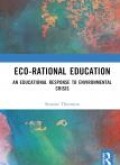 | Thornton, Simone, Eco-rational education: An educational response to environmental crisis, (Routledge: London; New York) 2024Eco-Rational Education proposes an educational response to climate change, environmental degradation, and destructive human relations to ecology through the delivery of critical land-responsive environmental education. The book argues that education is a powerful vehicle for both social change and cultural reproduction. It proposes that the prioritisation and integration of environmental education across the curriculum is essential to the development of ecologically rational citizens capable of responding to the environmental crisis and an increasingly changing world. Using philosophical analysis, particularly environmental philosophy, pragmatism, and ecofeminism, the book develops an understanding of contemporary issues in education, especially inquiry-based learning as pedagogy, diversifying knowledge, environmental and epistemic justice, climate change education, and citizenship education. Eco-Rational Education will be of interest to researchers and post-graduate students of social and political philosophy, educational philosophy, as well as environmental philosophy, ethics, and teacher education. |
 | Masamichi Ueno, Philosophy of Education in Dialogue between East and West: Japanese Insights and Perspectives, (Routledge) 2023 |
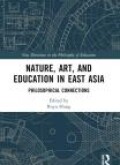 | Ruyu Hung, Nature, Art, and Education in East Asia: Philosophical Connections, (Routledge) 2023This volume explores the deeply interwoven connection of education, art and nature in the context of East Asia. |
